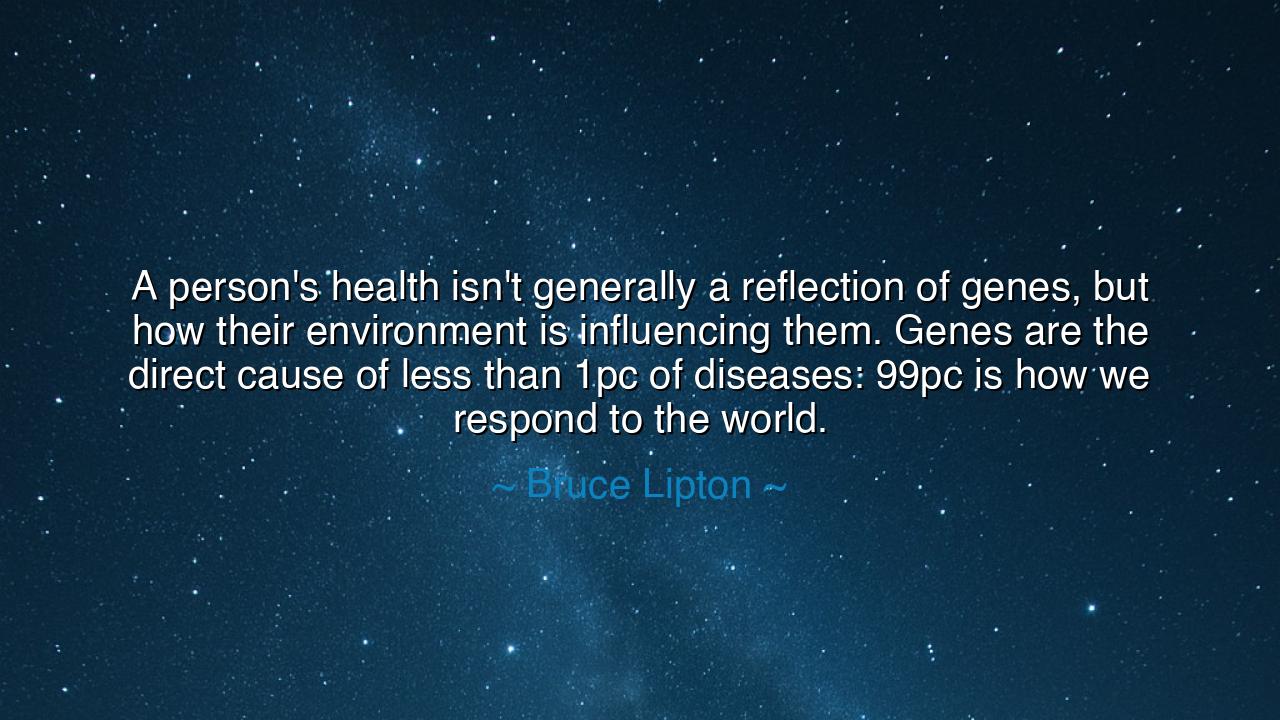
A person's health isn't generally a reflection of genes, but how
A person's health isn't generally a reflection of genes, but how their environment is influencing them. Genes are the direct cause of less than 1pc of diseases: 99pc is how we respond to the world.






In the profound words of Bruce Lipton, a biologist of both science and spirit, we find a revelation that bridges the wisdom of the ancients and the discoveries of the modern age: “A person’s health isn’t generally a reflection of genes, but how their environment is influencing them. Genes are the direct cause of less than 1% of diseases: 99% is how we respond to the world.” This truth resounds like a sacred bell in the temple of understanding, reminding humanity that we are not prisoners of our blood, but sculptors of our fate. The body, he tells us, is not ruled by destiny written in DNA, but by the thoughts, emotions, and surroundings that shape its expression.
The ancients would have nodded in knowing agreement. For long before microscopes and molecular codes, they spoke of balance, of harmony between body, mind, and environment. The healers of China called it Qi—the life energy flowing in accord with nature. The sages of India named it Prana, sustained by food, thought, and air. The Greeks, too, believed that the health of a person depended not only on the humors within, but the air, water, and temperament without. Lipton’s science, born of cells and experiments, merely awakens the same eternal principle: that health is the fruit of alignment—between ourselves and the world that breathes around us.
To say that genes control our destiny is to forget that genes are only instruments, awaiting the direction of the mind’s melody. The environment—our choices, emotions, and beliefs—strikes the chords that bring life or discord. Lipton calls this the biology of belief, and in it we rediscover the old truth: that thought is substance, and the inner world commands the outer. A person filled with gratitude and peace releases healing; one consumed by fear and bitterness poisons their very cells. Thus, the battlefield of health is not fought in the blood, but in the unseen realm of consciousness.
Consider the story of Viktor Frankl, the Jewish psychiatrist who survived the hell of the concentration camps. Surrounded by death, disease, and despair, he could not control his environment—but he could control his response. By choosing meaning over misery, hope over hatred, he kept his spirit alive, and in doing so, preserved his body against impossible odds. His story embodies Lipton’s truth: that how we respond to the world determines whether we wither or endure. Even in the darkest conditions, the power of the mind can alter the fate of the flesh.
Lipton’s words are a challenge to those who would surrender to fatalism. To say, “It is in my genes,” is to forget the divine power of choice. The genes may hold the map, but you are the traveler. You choose the paths you take, the storms you face, and the shelter you seek. Through diet, thought, breath, connection, and love, you write the script of your own health. The body listens to the whispers of your habits and the songs of your emotions. If you speak to it with stress and anger, it trembles; if you speak with kindness and patience, it heals.
The ancients taught that the universe and the self are mirrors of one another. When the world around us is poisoned by noise, greed, and fear, our bodies echo that turmoil. But when we cultivate stillness, gratitude, and respect for life, the cells within harmonize with the cosmos without. Lipton’s teaching is, therefore, not merely biological—it is spiritual. It tells us that to heal the body, we must also heal the environment—the air we breathe, the company we keep, the thoughts we harbor, and the world we build.
Let the lesson be carried like a flame: you are not the victim of your genes; you are the author of your health. Your environment, both outer and inner, writes upon the scroll of your DNA. Choose wisely what you allow to shape you. Fill your days with movement, sunlight, clean air, and compassion. Guard your mind as you would a sacred garden, letting only truth and serenity take root. For as Bruce Lipton reminds us, 99% of disease is how we respond to the world—and in that response lies both our suffering and our salvation.
So live as the ancients advised and the scientists now affirm: in harmony. When the storms of life come, do not curse them—learn to bend, like the willow that survives where the oak breaks. For your health is not fate, but a reflection of your relationship with the world. Heal that relationship, and you will heal yourself.






AAdministratorAdministrator
Welcome, honored guests. Please leave a comment, we will respond soon